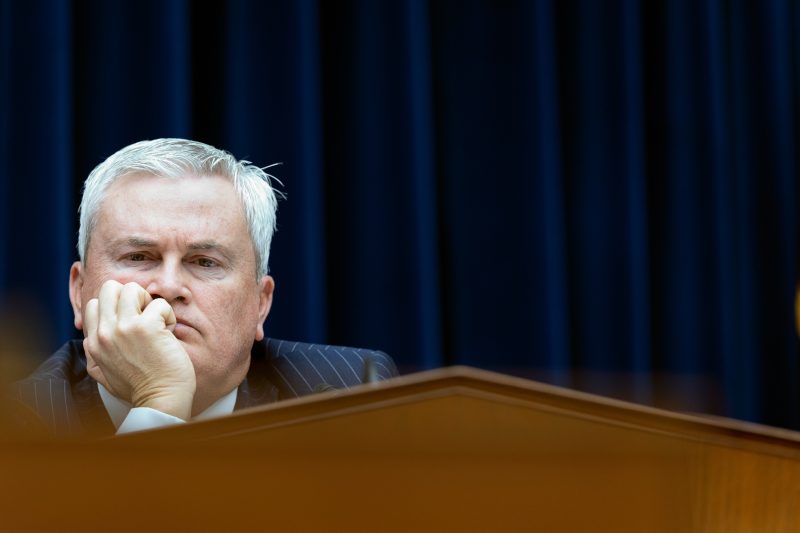When then-Speaker Kevin McCarthy (R-Calif.) announced in September that the House Republican conference would move forward with an impeachment inquiry targeting President Biden, he identified a few promising threads of investigation.
One was that “a trusted FBI informant has alleged a bribe to the Biden family.” Another was that Biden had been inappropriately involved with his son Hunter’s engagement with a Ukrainian energy company. A third was that Biden appeared to be broadly involved in his son’s and brother’s business activities.
At the time, none of these was substantiated. In fact, much of McCarthy’s framing even then was obviously misleading or flatly dishonest. But then, the goal was to investigate these things and perhaps reinforce the allegations.
That is not what has happened.
Last week, the first thread above blew apart in spectacular fashion. The “trusted FBI informant” was indicted on a charge of lying to the FBI in 2020 specifically about the alleged bribe to Joe Biden. The indictment presents extensive evidence both that the informant couldn’t have had the conversations he said he had — conversations that were themselves only secondhand documentation of the alleged bribes — and that the informant was eager to see Biden’s campaign falter. Then it got worse: The informant allegedly has connections to foreign intelligence, including in Russia.
(An aside: It is not alleged that the bribery allegation was a product of interference from foreign intelligence. Instead, the new allegation about those connections points to a different effort to impugn Hunter Biden as being linked back to Russia.)
The House Republicans leading the impeachment inquiry, including Oversight and Accountability Committee Chairman James Comer (Ky.) and Judiciary Chairman Jim Jordan (Ohio), had repeatedly hyped the bribery allegation as a central element of their probe. The implosion left them scrambling and parsing words, with Comer — responsible more than any other person on Capitol Hill for elevating the allegation — telling a Newsmax host Wednesday that the informant himself wasn’t an important part of the investigation.
Jordan, meanwhile, was an unwitting participant in a clip shared widely on social media that same day.
Raju: You said the 1023 is the most corroborating piece of information
Jordan: It doesn’t change those fundamental facts
Raju: But it’s not true. pic.twitter.com/Jhfsa8ErK0
— Acyn (@Acyn) February 21, 2024
CNN’s Manu Raju pressed Jordan on his representations about the bribery allegation.
“It doesn’t change the four fundamental facts,” Jordan replied, walking through those four facts about the probe.
“You said the 1023 is the most corroborating piece of information you have,” Raju then pressed him, referring to the form documenting the informant’s allegations.
“It corroborates, but it doesn’t change those fundamental facts,” Jordan replied.
“It’s not true!” Raju said.
This seems like a pretty brutal exchange for Jordan, certainly. But only if we gloss over the “four facts” Jordan’s talking about — claims that deal not with the first, bribery-related thread that was blown apart by the indictment of the informant but that instead deal with the second thread, the one about Hunter Biden’s Ukrainian business partners. So the gotcha by Raju isn’t quite what it seemed.
But for all practical purposes, it didn’t matter, since the “four facts” thing Jordan likes to do has also been debunked.
He began using this line last year, that there are “four fundamental facts” that show how Joe Biden acted inappropriately while serving as vice president. We’ve picked this apart previously. The upshot is that it falsely asserts that Joe Biden wanted a Ukrainian official fired to benefit Hunter’s business partner, which has been debunked repeatedly. It also depends on the idea that Joe Biden made a trip to Ukraine after a call from Hunter Biden — a call that probably wasn’t made to Joe Biden and that came days after Biden had already announced the trip.
In other words, Jordan’s efforts to deflect Raju’s questions about the collapse of the bribery claim centered on raising other debunked allegations against Biden.
(Another aside: Technically, McCarthy’s framing of Joe Biden’s purported involvement with Hunter’s Ukrainian partners focused on an email exchange between someone in Biden’s office and a colleague of his son’s, but in an abundance of graciousness we have updated the allegation to match his allies’ current position.)
Then there’s that third thread, this broad argument that Joe Biden has been a quiet/hidden partner with his son and his brother James Biden. Most of the energy that Republicans have invested in the impeachment investigation has centered on finding some proof that Joe Biden benefited from his family’s businesses. The result? They have no more evidence than they did 14 months ago.
Sure, they documented that Hunter Biden leveraged his family name as an income stream. They learned that on some occasions when Joe Biden would call his son, his son would be in meetings with business partners and put him on speakerphone. They learned that both Hunter’s business and James Biden personally had paid Joe Biden thousands of dollars — money that was demonstrably in repayment of loans.
They have also heard from witnesses testifying under penalty of perjury that Biden wasn’t involved in the business. Over and over and over, the same refrain. The most recent person to state that was James Biden himself, testifying behind closed doors on Capitol Hill on Wednesday.
“I have had a 50-year career in a variety of business ventures,” he said in his opening statement. “Joe Biden has never had any involvement or any direct or indirect financial interest in those activities. None.”
He joins every other interviewed participant in those business activities in rejecting the idea that Joe Biden was involved: Devon Archer, Eric Schwerin, James Gilliar. Even Anthony Bobulinski, who in 2020 joined campaign events for former president Donald Trump, was unable to show any evidence that Biden had been involved in the business.
The important point here is that Republicans are correct when they say that the collapse of the bribery allegation does not by itself derail the entirety of their impeachment probe. In addition to their decision to emphasize that dubious allegation, the probe has also been derailed by their failure to find evidence of wrongdoing. There are discrete elements here that stand alone — or, as the case happens to be, collapse independently.
Put another way, it is not the FBI informant’s fault that the effort to impeach Biden is turning into an embarrassment for Republicans. It’s their fault.








